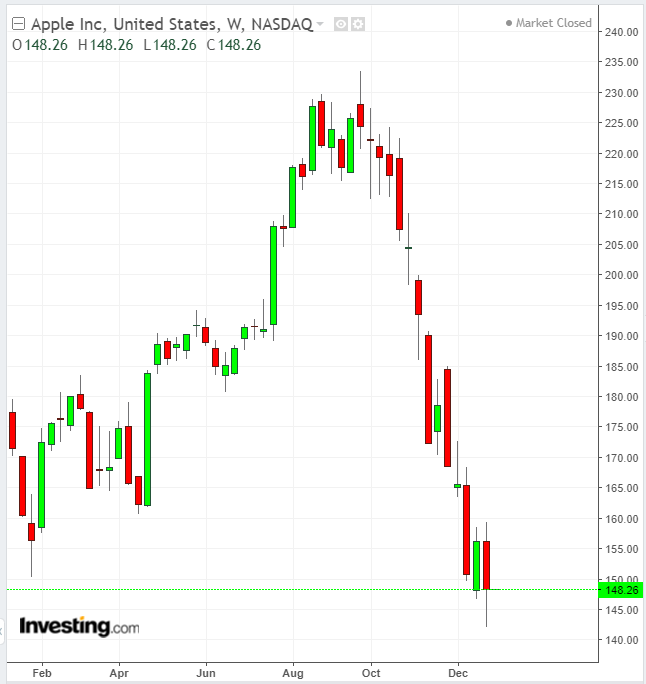When a company as credible and highly followed as Apple (NASDAQ:AAPL) miscalculates its forward guidance, it can be tough to quickly repair the damage that follows. Last Wednesday, after markets closed, the company’s CEO, Tim Cook, tried keeping the situation on an even keel when, about a month ahead of the Apple's official earnings report, he cautioned that the company would significantly miss its sales forecast for the holiday quarter.
In a letter to investors, released the same day, Cook wrote:
“We manage Apple for the long term, and Apple has always used periods of adversity to re-examine our approach, to take advantage of our culture of flexibility, adaptability and creativity, and to emerge better as a result.”

The shortfall warning caught markets by surprise; at Thursday's open, investors started dumping Apple shares. By the close, the stock had tumbled 10%, the biggest drop in almost six years.
What triggered this magnitude of destruction was the timing of the announcement. The cut in sales outlook came just two months after Apple presented a rosy picture for its flagship product, the iPhone, during its Q4 2018 report in early November.
This is the first time in almost two decades that Apple is slashing its revenue forecast, predicting sales will be about $84 billion in the quarter ended December 29, down from earlier estimates of $89-$93 billion, the result of a slowdown in China. The big question for investors, of course, is whether this might be the start of a downward spiral for tech giant?
Fundamental Growth Challenges
For Apple bears, the current environment highlights the fundamental challenge the company is facing in its next stage of growth: convincing customers that they should pay more for iPhones, at a time when the smartphone industry has hit a peak and cheaper phones are flooding the market. Indeed, average prices for iPhones are nearly five times that of non-Apple smartphones sold globally, according to a recent report in the Wall Street Journal, citing Sanford C. Bernstein analyst Toni Sacconaghi.
As well, the upgrade cycle for all smartphones appears to be slowing. Just four years ago, US consumers upgraded their devices every 24.4 months, according to BayStreet Research LLC, which tracks smartphone sales. The upgrade rate extended to 36 months in the quarter that just ended, the firm estimates. And it expects the length of time that US consumers hold their phones to average 38.7 months over the course of the coming year.
According to that bleak assessment, any improvement in the macroeconomic environment—should the US and China resolve their trade dispute quickly—won’t drastically change the company’s future outlook. That view seems appropriate in an environment of uncertainty, fear, and slowing growth in China, a market that’s crucial for Apple.
But we remain optimistic about Apple’s future expansion and its massive power of innovation. We think that's the key fundamental that the market is discounting right now.
It's hard to fathom that the company has suddenly lost its ability to wow customers through product improvement and the development of new, cutting edge features. As for the Chinese marketplace, Apple has a history of overcoming challenges in that tough arena. Sales there dropped in both fiscal 2016 and 2017, but overall, the company continued its upward trajectory.
There's another, potentially major growth driver for Apple: India. The subcontinent remains the biggest, untapped smartphone market for the company; iPhones account for just 1% of overall smartphone sales in the region.
The company can turn the corner in India if it starts to produce smartphones there and opens its own stores—the two major impediments that Cook cited for its weak performance in that market.
Apple remains a leader in innovation in the smartphone industry. If the industry is up for any fundamental change, in our view it will be Apple that has the power and financial muscles to quickly adjust to any new reality.
In addition, it has a number of other product lines that already command customer loyalty and spur recurring sales, including smart watches, music services and its app store, and perhaps, based on rumors that began circulating this past August, an Apple-branded car that could launch sometime between 2023 and 2025.
Bottom Line
The world’s most successful value investors, including Warren Buffett, believe in Apple’s business model and view the stock as a solid long-term investment.
As we've advised repeatedly, one should never sell a stock that has strong fundamentals on short-term setbacks.This is particularly true for Apple. Its recent dip is a chance to buy or add to your holdings if you have a long investment horizon.
